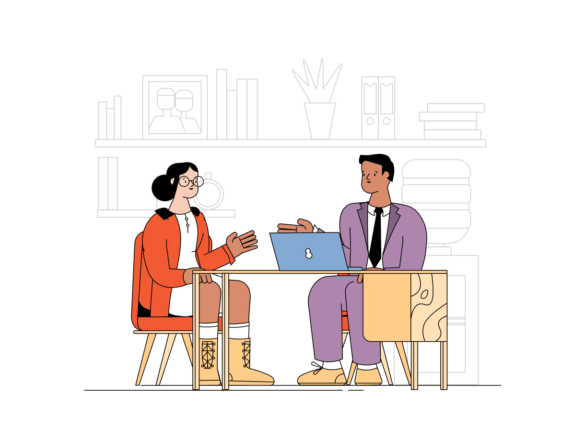To be selected as an applicant and receive an assessment for an available spot with a company, you must possess various skills for an interview. You will also need a few fundamental abilities to assist you to thrive in the interview and land your dream job.
Interview skills are abilities or behaviors that enable individuals to be more efficient during the process of an interview. While you may have excellent qualifications, exceptional interview skills will make you stand out from the crowd.
Generally, employers look at these skills to determine whether or not you fit the position. Research skills, communication skills, and preparation are among the most critical interview skills. This article explores a list of skills for interview that you must possess to help you pass your upcoming job interview.
Research
By leveraging the knowledge of the company and the position you are applying for, you will be in a better place to ace the interview. Set aside time to research both the firm and the job so you can have adequate information that you will use to your advantage.
You can study an organization in a variety of methods, including:
- Search up the firm’s name on the internet and review any media releases or other material that comes up
- On their webpage, go to the “About” section to learn more about the company
- Visit their social media networks if they have some
- If feasible, speak with corporate staff.
It would help if you also spent some time learning everything you can about the job you’re interviewing for. Research the job description and check the corporate website for the job advertisement if one is accessible. This will give you an idea of what to expect, and you will be better equipped for the interview.
Preparation
It’s best not to go up for an interview unprepared. Otherwise, your self-confidence and answers could suffer if you don’t take time to prepare. What’s more, this could reflect poorly on you as a prospect since most recruiters can easily spot unprepared candidates.
Allow at least half an hour beforehand or on the appointment day to prepare. Here are a few things to think about as you get ready:
- Recheck the position description to identify the essential duties and qualifications for the position.
- Prepare many precise responses to probable queries about the position you’re looking for and the responsibilities you’ll be required to do.
- Create a list of the job’s most important features so you can refer to it when responding and asking questions during the interview.
- Examine your CV and Cover letter that you sent to the company to understand how you introduced yourself.
- Spend a few minutes, if not hours, looking up probable interview questions on the role you’re looking for and the area in which the business operates.
- Look into less precise interview questions that aren’t connected to the job but could be asked. Prepare a few behavioral and contextual questions in interviews, for instance.
- Prepare a list of particular instances from your previous work experiences, such as achievements, difficulties, and accomplishments. These will bolster your interview responses and reinforce your answers.
- Examine your thoughts on the company you made throughout your research to ensure that the material is fresh in your mind when you walk into the interview.
Excellent Communication Skills
It goes without saying that communication is one of the most important skills for interview. Your communication skill can be a significant determinant of whether or not you will ace the interview.
You need to possess excellent communication skills, including written, vocal, and nonverbal communication abilities. These skills are crucial for the effective execution of job duties and responsibilities.
Here are a few crucial points to remember when talking with others during an interview:
Address the interviewer by name and make sure the terms are pronounced appropriately. Also, use the right words and avoid jargon or shortened language.
You may also want to start the interview with some light conversation. It’s ideal to come prepared with a few professional discussion points that are appropriate for an interview situation. Tell a compelling story of who you are, your brand, and what you can offer the employer.
Make sure your style of communication is compatible with the recruiting manager’s. If the recruiting manager is speaking formally, attempt to match your tone to theirs.
If they’re more optimistic and crack jokes now and again, don’t hesitate to do the same if it’s suitable. However, don’t go overboard. Take note of their nonverbal clues and use the same if possible. When asked why you left your job, be honest but do not bad mouth your former employer.
Punctuality
The last thing you want is to arrive late for your interview. It is highly recommended to arrive at least 15 minutes before the specified interview time on the interview day. Most organizations look for this value because it indicates how timely you will be regularly if you get the job.
To keep time, arrange your interview attire and all the necessary documents the night before the interview. Don’t forget to set the alarm and ensure you get to the interview on time.
Organization
Besides, punctuality also goes hand-in-hand with the organization. An organized employee knows how to manage their time, prioritize tasks and strive to meet deadlines. Carefully arrange and present your documents in a way that shows you are well organized.
Professionalism

Professionalism encompasses several factors, all of which are crucial while having a job interview. To start, make sure you’re dressed professionally and that everything is polished and presentable.
Most people will judge you by your attire, which is no exception for interviewers. While you don’t want to go overboard with the high-end brands, ensure that you are dressed appropriately for the interview.
Do not wear clothing that is too informal, too big or too short, or too exposing. Instead, opt for neutral hues that complement each other and aren’t distracting or irritating. If you’re not sure what the dress code for the interview is, go for a more formal look to prevent looking too informal.
Something else that shows professionalism in an interview is a formal language. Be courteous to everybody you come in contact with, including other staff and office staff. Employers will perceive you as more likable and friendly if you are professional and polite in your behavior and comments.
Confidence
Confidence is another interview skill you want to display without coming off as arrogant. There is a fine line between confidence and cockiness. In most cases, the interviewers’ perception of you will be influenced by your confidence.
Arrive at the interview prepared to explain your experience, achievements, and skills confidently. Put on a performance to show your abilities to perform the responsibilities of the post you sought, but don’t sound too overconfident. Rather than merely boasting about your credentials, work to portray a balanced and courteous sense of confidence.
Listening
Another crucial aspect of a successful interview is the ability to listen. During an interview, you need to master the art of listening to the interviewer and plan how you’ll answer simultaneously. Of course, this can be a bit tricky, but it is still possible.
When the recruiter is speaking, pay attention and repeat what they said, either in your head or out loud when necessary. This will enable you to verify the interview questions to understand thoroughly.
When the other person is talking, employ nonverbal indicators such as nodding and good eye contact. To better understand what’s being said, prevent abruptly shifting the topic and pay attention to any nonverbal indications the interviewer gives you, such as facial expressions and tone of voice.
Ask Questions
During or after the interview, recruiters frequently ask applicants whether they have any queries. Use this opportunity to ask the interviewer some questions to do the interview more like a two-way conversation.
Recruiters look for applicants who ask sincere questions to learn more about the firm and the position. Come at the interview ready with some questions to ask the recruiter that expresses genuine interest in the position.
Asking questions will help you address aspects of the work that were not addressed during the interview. Furthermore, it will help you gauge whether the company is suitable for you.
Showing Interest

Throughout a job interview, it’s critical to show genuine interest in the role you are applying for. Otherwise, the interviewer may conclude that you don’t desire the job if you appear uninterested or unconcerned about the results.
Nevertheless, do not appear desperate or less confident. Try to show interest while remaining calm, relaxed, and confident as much as possible.
Follow-Up
Several hiring managers believe that following up shortly after an interview is critical. Don’t underestimate the importance of expressing gratitude after an interview. A modest thank-you letter or text could go a long way toward demonstrating your interest in the job.
It is also an excellent way to appreciate the interviewer for their time and taking the opportunity to help you learn more about the position. You can make a follow-up email or message the same day, or the next day at the latest, after the interview.
Bottom Line
Interview success necessitates thorough preparation and the capacity to feel at ease and comfortable when presenting your abilities, expertise, and credentials with recruiters. Regardless of the skills you possess, you may need to brush up on your interviewing skills from time to time to make sure hiring new talents is a success.
Before an interview, it is critical to prepare. Attempt to make a great first impression during the interview, listen carefully, ask questions, and pay great attention to your voice and body gestures.
Don’t forget to deliver a thank you email to all engaged in the process once the interview is completed. Whether you get the job or not, ask for criticism so you may learn from your mistakes and enhance your interviewing skills in the future.
